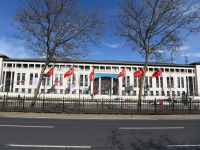Economic strides have been made under the Jordanian-Algerian Joint Committee, but potential investment opportunities in the African country remain unexploited, said Hamid Chebira, Algeria's ambassador to Amman on Saturday.
Making his remarks one day before the launch of the first Algerian Product Show, Chebira cited the lack of proper awareness on potential opportunities in both countries as a barrier to the negligible trade exchange.
"There is insufficient information about the economic situation for the Algerian side and vice versa," Chebira said at a press conference.
According to him, the trade balance, put at no more than $20 million, and swinging heavily in the Kingdom's favor, is below the aspired level.
Jordanian exports to Algeria are mainly concentrated in the pharmaceutical industry where Jordan stands as the second largest exporter of drug products.
"Thus, the fair will be a chance for Jordanian businessmen to be familiarized with Algerian industries," said Chebira.
The committee, headed by prime ministers in both countries, is entrusted with setting up all legal measures and framework to help boost bilateral ties.
It has so far wrapped up 12 agreements in various fields, chief of which was trade exchange agreement.
"This agreement was one of the significant steps towards opening the door in the face of free trade between the two countries," said the ambassador.
During its meeting in Amman in May, the third since its creation in 1996, the committee agreed to eliminate trade barriers by easing export and import procedures from and into both countries.
Other agreements were reached in agriculture, pharmaceuticals, social development, culture, media, education, labor, sports and youth and tourism.
But Chebira noted that further adjustments to the articles of the agreements could be amended when necessary.
"One year after it has come into force, we feel it is time for evaluation and introducing amendments to cope with the advancement in bilateral relations," said Chebira.
According to Chebira, transportation is still an impediment to better economic ties.
"Currently the Algerian carrier operates one flight a week... 'But the Royal Jordanian seemed positive on operating flights to that destination," said Chebira.
He added that a joint firm for maritime transport is on the agenda of the committee.
The ambassador said that booming cooperation has been spotted in the Jordanian medical and pharmaceutical sectors.
Under the 1997 health cooperation protocol, hundreds of Algerian patients have been treated in the Kingdom's hospitals due to the advancement in medical services.
Early this month, visiting Algerian Health Minister Amarah Ben Younis and his Jordanian counterpart Tareq Suheimat signed a health agreement benefiting Algerian patients.
Chebira also pointed to the pharmaceutical industry which he said could be expanded through the establishment of joint ventures in the North African country.
He stressed that the Jordanian pharmaceutical producers could make use of the incentives provided by the Algerian legislation.
Other areas of cooperation, said the ambassador, are in the energy and heavy industry sectors.
"We are very willing to cooperate in these fields, whether searching for oil, supplying the Kingdom with natural gas, or developing any industry in these areas." ― (Jordan Times)
By Rana Awwad
© 2000 Mena Report (www.menareport.com)







